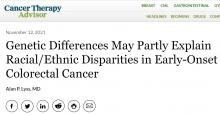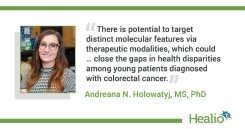Holowatyj receives National Cancer Institute MERIT Award
https://news.vumc.org/2023/07/19/holowatyj-receives-national-cancer-institute-merit-award/
"'As the number of adults within their childbearing years diagnosed with, treated for and surviving colorectal cancer continues to rise, reproductive health concerns remain an unmet need within this growing patient population. Funding from this NCI MERIT award directly supports our research that aims to close this gap and ultimately lead to incorporating reproductive health care into routine clinical management of early-onset colorectal cancer and to improve our patient outcomes,' Holowatyj said."
JCO After Hours Podcast: Racial/Ethnic Differences Discovered in Multigene Germline Testing of Early-Onset Colorectal Cancer
Early-onset colorectal cancer germline genetic differences identified by race, ethnicity
https://medicalxpress.com/news/2023-06-early-onset-colorectal-cancer-germline-genetic.html
'"As the incidence rates of early-onset colorectal cancer continue to rise and yield a disproportionate impact across diverse populations, our findings draw timely attention to the need for health equity considerations in multi-gene panel testing development,' said the study's corresponding author, Andreana Holowatyj, Ph.D., MSCI, assistant professor of Medicine at Vanderbilt University Medical Center and Vanderbilt-Ingram Cancer Center."
Clinical Multigene Panel Testing Identifies Racial and Ethnic Differences in Germline Pathogenic Variants Among Patients With Early-Onset Colorectal Cancer
https://ascopubs.org/doi/full/10.1200/JCO.22.02378
"Germline genetic features differed by race/ethnicity in young patients with CRC, suggesting that current multigene panel tests may not be representative of EOCRC risk in diverse populations. Further study is needed to optimize genes selected for genetic testing in EOCRC via ancestry-specific gene and variant discovery to yield equitable clinical benefits for all patients and to mitigate inequities in disease burden." - Dr. Holowatyj and colleagues
Investigators Struggle to Understand Causes Behind Growth of Appendix Cancer
https://www.onclive.com/view/investigators-struggle-to-understand-causes-behind-growth-of-appendix-cancer
“My team conducted a few studies, particularly one that wanted to look at the burden of appendix cancers in young adults,” she said. “And what we strikingly found there was that, in contrast to the fact that about 1 in every 5 colorectal cancer patients is diagnosed before the age of 50, we found that 1 in every 3 [30.8%] appendix cancer patients are diagnosed before age 50.4. Noting this really disproportionate burden in younger patients really spurred a lot of the subsequent work that my lab has done and continues to do."
Seeking Clues to Early-onset Colorectal Cancer
https://www.aacr.org/blog/2023/03/15/seeking-clues-to-early-onset-colorectal-cancer/?utm_medium=twitter&utm_source=social&sf175949925=1
Understanding the biological underpinnings of early-onset colorectal cancer has been a major focus of Andreana N. Holowatyj, PhD, MS, assistant professor of medicine and cancer biology at the Vanderbilt University Medical Center and Vanderbilt-Ingram Cancer Center. In a study published this month in AACR journal Cancer Discovery, Holowatyj and colleagues explained that while the cause of early-onset colorectal cancer is unknown, multiple factors likely contribute, including diet, social determinants of health, and genetics.
Racial/ethnic and sex differences in somatic cancer gene mutations among patients with early-onset colorectal cancer
https://aacrjournals.org/cancerdiscovery/article-abstract/doi/10.1158/2159-8290.CD-22-0764/711679/Racial-ethnic-and-sex-differences-in-somatic?redirectedFrom=fulltext
There were significant differences for LRP1B, FLT4, FBXW7, RNF43, ATRX, APC and PIK3CA mutation frequencies in early-onset non-hypermutated CRCs between racial/ethnic groups. Heterogeneities by race/ethnicity were observed for the effect of APC, FLT4 and FAT1 between early-onset and late-onset non-hypermutated CRC. By sex, heterogeneity was observed for the effect of EP300, BRAF, WRN, KRAS, AXIN2 and SMAD2. Males and females with non-hypermutated CRC had different trends in EP300 mutations by age group.
Holowatyj named chair of scientific advisory board for ACPMP Research Foundation
https://news.vumc.org/2022/07/15/holowatyj-named-chair-of-scientific-advisory-board-for-acpmp-research-foundation/
“The Appendix Cancer Pseudomyxoma Peritonei Research Foundation has delivered immeasurable support to patients and scientists alike for nearly 15 years, and I am honored that the foundation has entrusted me with this inaugural role. My vision for the Scientific Advisory Board is to serve as an impetus to propel a new era of scientific discovery and innovation toward a cure for appendix cancer and pseudomyxoma peritonei for our patients and families,” said Dr. Andreana Holowatyj.
Rare appendiceal cancer affecting younger adults
https://discover.vumc.org/2022/06/rare-appendiceal-cancer-affecting-younger-adults/
“Appendiceal tumors harbor different molecular features from colorectal cancers,” [Holowatyj] said. “They present and spread differently, don’t respond to the chemotherapy most colorectal tumors do, and they disproportionately affect younger adults. These cancers shouldn’t be conflated with those of cecal origin, particularly in tumor registries.”
Improving outcomes for patients with appendiceal cancer
https://www.targetedonc.com/view/improving-outcomes-for-patients-with-appendiceal-cancer
"Given the alarming increase that we're seeing in appendiceal cancer incidents, we don't understand why. With these undetermined causes, these distinct patterns and disparities and disease outcomes that our team has discovered, particularly among young individuals, is really critical to accurately diagnose and distinguish these malignancies. I've mentioned the potential misclassification of appendiceal cancer as colon cancer really introduces barriers to us to discover disease specific risk factors, potential tumor biomarkers, and that has implications and risk assessment surveillance screening as well as treatment."
New fund supports appendiceal cancer research
https://news.vumc.org/2022/01/27/new-fund-supports-appendiceal-cancer-research/
Due to the challenges associated with studying this rare malignancy, many fundamental questions related to appendix cancer etiology and biology remain unanswered. Is there a genetic susceptibility to appendix cancer? Due to the generosity of the Dalton Family Foundation, that’s a question our team is well on our way to answering today.
What oncologists should know about appendiceal cancer
https://www.targetedonc.com/view/what-oncologists-should-know-about-appendiceal-cancer
Appendiceal cancer is a unique malignancy because these cases are often discovered in an acute situation, meaning that we see appendiceal tumors incidentally found in about nearly 10% of cases undergoing a routine appendectomy. We do not yet understand the role of obesity and appendiceal cancer risk or outcomes are really detailed risk factors contributing to this disease burden across all ages and particularly among young patients. Of course, early disease detection and care for this malignancy as well as considering that it is its own distinct etiology and cancer type is I think, going to be the most important to help us really healed advances in this tumor type.
Survival disparities identified in real-world patients with appendiceal cancer
https://www.targetedonc.com/view/survival-disparities-identified-in-real-world-patients-with-appendiceal-cancer
Appendiceal cancer is a rare malignancy, and has an age adjusted incidence rate of about 0.12 per million person years. As a consequence of the rarity of this malignancy, there are challenges and significant advances in the discovery and understanding of risk factors disease, biology, and epidemiology. This also presents challenges in understanding disease pathogenesis, which is needed to develop clinical management guidelines. So currently, the guidelines from the National Comprehensive Cancer Network recommend a hemicolectomy followed by adjuvant chemotherapy as definitive treatment for early-stage appendiceal cancers. The guidelines are very similar to colon cancer guidelines, largely because there's a lack of robust data for appendix cancer. These treatment regimens are also extrapolated from clinical studies related to colon cancer.
Genetic differences may partly explain racial/ethnic disparities in early-onset colorectal cancer
https://www.cancertherapyadvisor.com/home/cancer-topics/gastrointestinal-cancers/colorectal-cancer-genetic-difference-explain-racial-differences-risk/
Genomic patterns in patients with early-onset colorectal cancer (CRC) vary by race and ethnicity, per results our team presented at the 2021 AACR Virtual Special Conference: Colorectal Cancer. These novel findings also highlight the need for additional research into genetic and social factors that contribute to racial and ethnic disparities in early-onset CRC.
DNA Discoveries Podcast: Go Boldly: Stigma, the gut, and young adult colon cancer
https://discover.vumc.org/podcasts/go-boldly-stigma-the-gut-and-young-adult-colon-cancer/
In the Season 2 Episode 3 podcast of Vanderbilt Health DNA: Discoveries in Action podcast entitled, "Go Boldly: Stigma, the gut and young adult colon cancer", Dr. Holowatyj and colleagues had a didactic discussion with the goal of getting younger adults to be aware of what's in the porcelain bowl and normalize talking about bowel habits.
"It’s time to get loud about what happens in the bathroom. And although you might find that awkward, these four experts don’t. The increase in young adult colon cancer diagnoses underscores why everyone needs to be cognizant of what’s being flush, warning signs and be thinking about what gets digested... There is a stigma associated with talking about colorectal cancer and that people sometimes think it’s a disease for older people and that it can’t impact young people. And that’s a really important and urgent stigma to break.”
Spectrum of somatic cancer gene variations among adults with appendiceal cancer by age
https://oncologytube.com/video/39762/andreana-n.-holowatyj-ph.d.-drholowatyj-vumc_cancer-carcinoma-cancer-research-spectrum-of-somatic-cancer-gene-variations-among-adults-with-appendiceal-cancer?channelName=cancernewsupdate#gsc.tab=0
The incidence of appendiceal cancer (AC) is growing with unknown etiologies, especially among individuals younger than 50 years of age (early onset of AC). In patients with early-onset AC, the unique spectrum of somatic cancer gene variations is largely undetermined.
In our study, relative to AC diagnosed among older individuals, we discovered that AC diagnosed among younger individuals had a distinct genomic landscape. Specifically for younger patients, the creation of therapeutic modalities that target these unique molecular features can produce clinical implications.
Genomic differences by race emerge in colorectal cancer
https://aacrjournals.org/cancerdiscovery/article/11/6/OF1/666621/Genomic-Differences-by-Race-Emerge-in-Colorectal
The Holowatyj Lab and colleagues discovered that Black, white, and Asian/Pacific Islander patients with early-onset colorectal cancer have different patterns of nonsilent mutations than their late-onset counterparts. Additionally, within the early-onset population, Black patients had a significantly higher tumor mutation burden (TMB) than white patients. These findings, while preliminary, offer a glimpse of the biological basis of disparities—information that could eventually have therapeutic implications. Read more about this intriguing study in this AACR Cancer Discovery article!
Andreana N. Holowatyj, PhD, MS, talks AACR and the value of the annual meeting 2021
https://www.cancernetwork.com/view/andreana-n-holowatyj-phd-ms-talks-aacr-and-the-value-of-the-annual-meeting-2021
Andreana N. Holowatyj, PhD, MS, of the Vanderbilt University Medical Center, spoke with CancerNetwork® about the benefits of a conference like the American Association for Cancer Research (AACR) Annual Meeting 2021, and how the collaborative network of thought leaders presents ample opportunity to move the field forward.
Andreana N. Holowatyj, PhD, MS, emphasizes the complexity of her research in colorectal cancer and future opportunities
https://www.cancernetwork.com/view/andreana-n-holowatyj-phd-ms-emphasizes-the-complexity-of-her-research-in-colorectal-cancer-and-future-opportunities
In a conversation with CancerNetwork®, Andreana N. Holowatyj, PhD, MS, of the Vanderbilt University Medical Center, walked through the potential future research to come from her data presented at the American Association for Cancer Research (AACR) Annual Meeting 2021, while emphasizing that race is just a small piece of a very complex puzzle for this research focusing on tumor mutation burden by race in early-onset colorectal cancer.
Andreana N. Holowatyj, PhD, MS, discusses focal questions regarding colorectal cancer disparities
Andreana N. Holowatyj, PhD, MS, on rising rates of early-onset colorectal cancer worldwide
https://www.cancernetwork.com/view/andreana-n-holowatyj-phd-ms-on-rising-rates-of-early-onset-colorectal-cancer-worldwide
Andreana N. Holowatyj, PhD, MS, of the Vanderbilt University Medical Center, spoke with CancerNetwork® about the increasing incidence of early-onset colorectal cancer, defined as disease in adult patients under the age of 50. Early-onset colorectal cancer and differences in molecular features of this disease were examined as they related to different racial/ethnic groups.
Utilizing AACR Project GENIE to research cancer disparities
https://www.aacr.org/about-the-aacr/newsroom/aacr-meeting-news/utilizing-aacr-project-genie-to-research-cancer-disparities/
Learn more about how our team utilized robust clinical-grade targeted sequencing and clinicodemographic data from the American Association for Cancer Research (AACR) Project Genomics Evidence Neoplasia Information Exchange (GENIE) international clinicogenomic data-sharing consortium to examine genomic differences in early-onset colorectal cancer among different racial groups.
Molecular characteristics of early-onset colorectal cancer appear to vary by race
https://www.healio.com/news/hematology-oncology/20210414/molecular-characteristics-of-earlyonset-colorectal-cancer-appear-to-vary-by-race
“The incidence of early-onset colorectal cancer among adults younger than age 50 years has been increasing during the past several decades, both in the U.S. and countries worldwide, with causes unexplained... Disparities in early-onset colorectal cancer across diverse population subgroups have grown more pronounced. Yet, in the absence of studies that explore the biology of early-onset colorectal cancer across these groups, our understanding of the molecular mechanisms underpinning early-onset colorectal cancer disparities remains limited.”
Patients of different races with early-onset colorectal cancer exhibit distinct genetic features
https://ascopost.com/news/april-2021/patients-of-different-races-with-early-onset-colorectal-cancer-exhibit-distinct-genetic-features/
“It’s quite striking that there has been, on average, a 1.5% increase in early-onset colorectal cancer incidence each year over the last 25 years or so,” [Holowatyj] said. “It has burgeoned into a public health crisis and highlighted the need to understand the factors that may be contributing to the rise in cases.”
Early-onset colorectal cancers from patients of different races may exhibit distinct genetic features
https://www.aacr.org/about-the-aacr/newsroom/news-releases/early-onset-colorectal-cancers-from-patients-of-different-races-may-exhibit-distinct-genetic-features/
“It’s quite striking that there has been, on average, a 1.5 percent increase in early-onset CRC incidence each year over the last 25 years or so,” [Holowatyj] said. “It has burgeoned into a public health crisis and highlighted the need to understand the factors that may be contributing to the rise in cases.”
Racial differences in somatic mutations among patients with early-onset CRC
Appendiceal cancer sequences suggest distinct mutation patterns in early-, late-onset cases
https://www.precisiononcologynews.com/sequencing/appendiceal-cancer-sequences-suggest-distinct-mutation-patterns-early-late-onset-cases#.YsdJInbMKUm
"[Appendiceal cancer] diagnosed among younger individuals harbored a distinct genomic landscape compared with [appendiceal cancer] diagnosed among older individuals. Development of therapeutic modalities that target these unique molecular features may yield clinical implications specifically for younger patients," co-corresponding authors Andreana Holowatyj and Xingyi Guo, both researchers at Vanderbilt University Medical Center, and their colleagues wrote in a paper published in JAMA Network Open.
Geography and behaviors linked to early-onset colorectal cancer survival in U.S. women
https://www.mdedge.com/hematology-oncology/article/233264/gastrointestinal-cancer/geography-and-behaviors-linked-early
“These individual- and community-level feature differences between hot spot and non–hot spot counties illustrate the importance of understanding how these factors may be contributing to early-onset CRC mortality among women – particularly in hot spot counties,” Dr. Holowatyj said in an interview. “They may provide us with key clues for developing effective strategies to reduce the burden of CRC in young women across the United States.
Study reveals distinct genomic landscape for young adults with appendiceal cancer
https://news.vumc.org/2020/12/17/study-reveals-distinct-genomic-landscape-for-young-adults-with-appendiceal-cancer/
“Appendiceal cancer among young patients harbors a distinct biology, which has potential clinical actionability,” said the study’s lead author, Andreana Holowatyj, PhD, MSCI, assistant professor of Medicine and Cancer Biology at Vanderbilt University Medical Center and an epidemiologist with Vanderbilt-Ingram Cancer Center.
Hot spots ID’d for higher CRC mortality in younger women
https://www.physiciansweekly.com/hot-spots-idd-for-higher-crc-mortality-in-younger-women/
Andreana N. Holowatyj, Ph.D., from the Vanderbilt University Medical Center in Nashville, Tennessee, and colleagues used data from the Surveillance, Epidemiology, and End Results program to identify women (aged 15 to 49 years) diagnosed with CRC. Geospatial autocorrelation was used to identify geographic hot spots of high rates of early-onset CRC mortality among women. Patterns of community health behaviors by hot-spot location were assessed.
Study defines geographic hot spots of early-onset CRC mortality among women
https://www.cancernetwork.com/view/study-defines-geographic-hot-spots-of-early-onset-crc-morality-among-women
“Together, these findings may inform cancer prevention/intervention strategies tailored to young patients and may ultimately help to inform knowledge to reverse early-onset CRC incidence trends and improve patient outcomes,” the authors wrote. “Additional studies to examine early-onset CRC incidence patterns by hot spot classification among women will be helpful to discern whether disease incidence rates are higher in regions with disproportionately high early-onset CRC mortality.”
Study identifies hot spots for colorectal cancer mortality rates among young women
https://www.news-medical.net/news/20201123/Study-identifies-hot-spots-for-colorectal-cancer-mortality-rates-among-young-women.aspx
"Colorectal cancer is becoming more common in young adults, and we don't entirely understand the 'why' just yet. This rising burden among young adults stresses the importance for accurate and early diagnosis of these malignancies. Primary care physicians and gastroenterologists around the country, and particularly in Nashville and other hot spot regions, should keep colorectal tumors in the differential diagnosis of young patients presenting with signs/symptoms of colorectal cancer."
Women below 50 with colon and rectal cancer in newly identified US 'hotspots’ are at high risk of death
https://www.ncbi.nlm.nih.gov/pmc/articles/PMC7678794/
We obtained data from the US Centers for Disease Control and Prevention and then analyzed data on 28,790 women collected from 1999 to 2016 by the Surveillance, Epidemiology, and End Results program from the National Cancer Institute. The objective of this study was to understand patterns of community health behaviors that may be linked to these survival disparities. The hotspot areas we identified—where colorectal cancer is killing young women at high rates—revealed the geographic variation and other trends. Approximately one in every 16 counties were identified as hotspots across the US, according to the findings published in the journal Clinical and Translational Gastroenterology. Other large-population counties with high mortality rates for women diagnosed with early-onset colorectal cancer include Miami-Dade County, Cook County (Chicago), Fulton County (Atlanta), New Castle County (Wilmington, Delaware), Fairfield County (Bridgeport, Connecticut), St Louis County, Bergen County (New Jersey suburbs of New York metropolitan area), Queens County (Queens borough of New York), Mecklenburg County (Charlotte, North Carolina), Hamilton County (Cincinnati, Ohio), Tulsa County and Philadelphia County. The authors suggest that physical inactivity and fertility may be factors contributing to this geographic variation in survival among young women with colorectal cancer since those community health behaviors modestly correlated with hotspot residence. However, they note that more study is needed to identify health behaviors that can be modified within these populations to improve patient survival.
Where are the geographic hotspots of high mortality rates for women with colorectal cancer?
https://www.labroots.com/trending/cancer/19257/geographic-hotspots-mortality-rates-women-colorectal-cancer
In our study published earlier this year, Nashville is not an area of high mortality for both men and women diagnosed with early-onset colorectal cancer, but when you take a step back and look at only women, now Davidson County and Nashville emerge. These results emphasize the need to understand these pronounced disparities in early-onset colorectal cancer burden not only by geographic region, but also by sex and race/ethnicity. This study comes as a follow-up to a previous study led by our team that identified hot spot counties for early-onset colorectal cancer mortality among both men and women. This new study focuses specifically on the hot spot geography in relation to the mortality rate of women.
Hot spots identified for colorectal cancer mortality rates among young women
https://news.vumc.org/2020/11/23/hot-spots-identified-for-colorectal-cancer-mortality-rates-among-young-women/
“Colorectal cancer is becoming more common in young adults, and we don’t entirely understand the ‘why’ just yet. This rising burden among young adults stresses the importance for accurate and early diagnosis of these malignancies,” said Andreana Holowatyj, PhD, MSCI, assistant professor of Medicine and Cancer Biology at Vanderbilt University Medical Center and Vanderbilt-Ingram Cancer Center, who is the study’s lead author. “Primary care physicians and gastroenterologists around the country, and particularly in Nashville and other hot spot regions, should keep colorectal tumors in the differential diagnosis of young patients presenting with signs/symptoms of colorectal cancer.”
Appendix cancer survival in young patients varies by race: study
https://news.vumc.org/2020/08/06/appendix-cancer-racial-disparities/
“Our discovery of disparities in survival across racial/ethnic groups and sex within this patient population noticeably parallels the unequivocal burden of COVID-19 by race or ethnicity and sex,” said Holowatyj, assistant professor of Medicine in the Division of Epidemiology. “These alarming health care realities heighten the need to understand the factors that contribute to disparities in disease susceptibility and prognosis in order to mitigate these differences, particularly for non-Hispanic Black individuals.”
Andreana N. Holowatyj, PhD, on the differential survival rates of appendiceal cancer according to race
https://www.medpagetoday.com/reading-room/aga/lower-gi/87191
"Among patients of all ages diagnosed with AC, incidence rates have increased while rates of appendectomy have remained stable. Together with the potential for misclassification of AC cases as malignancies of the colon, these data led us to raise questions as to what causes may underlie the changing epidemiology and rising burden of AC among patients younger than 50."
A rare cancer sees a rise in incidence in younger patients
https://www.medpagetoday.com/reading-room/aga/lower-gi/87190
Using population data from U.S. cancer registries to compare survival after early-onset AC among different races/ethnicities, we established general characterization of AC survival patterns. We acknowledge that molecular characteristics may account for some of these survival differences between races/ethnicities, as well as sexes, but also note that access to healthcare, which can also differ by individual racial/ethnic groups, may influence survival rates.

































